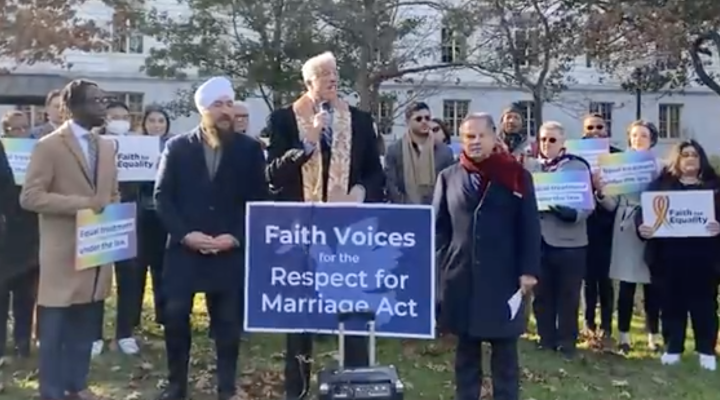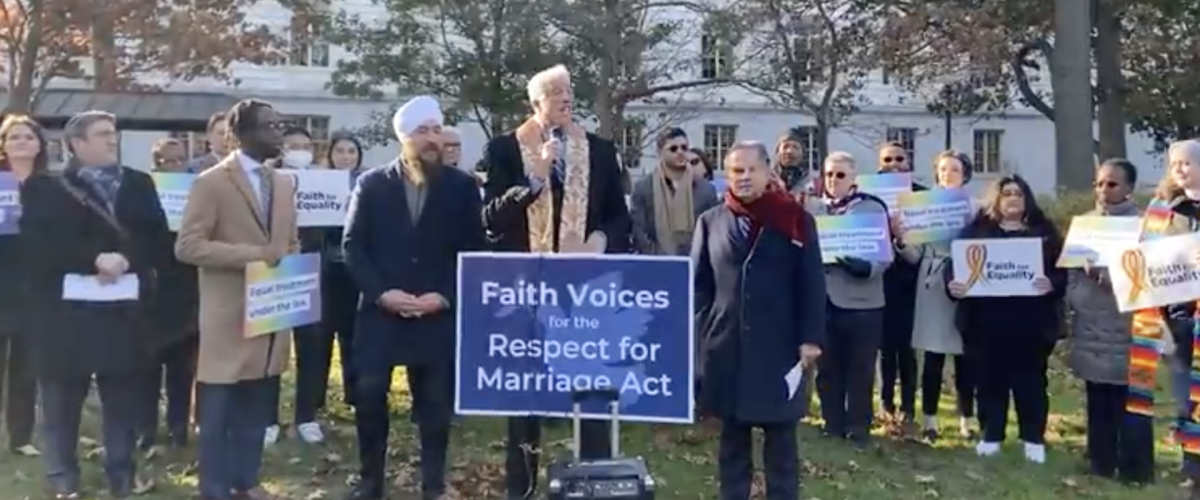Advocating for same-sex marriage and encouraging LGBTQ couples and parents is an act deeply rooted in religious values for many Americans, Rhode Island Congressman David Cicilline said.
He spoke during a Nov. 17 interfaith rally to promote the Respect for Marriage Act, which is pending in Congress and now stands a good chance of passing this year.
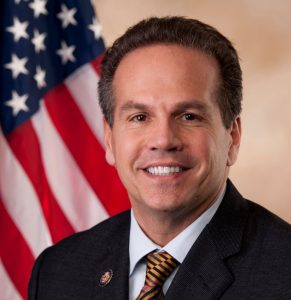
David Cicilline
“It should more frequently be noted that the majority of most religious groups support marriage equality, and in fact we know that many people support marriage equality not in spite of their religion, but because of it,” said Cicilline, a Democrat who chairs the Congressional LGBTQ Equality Caucus.
Such acceptance and support for same-sex marriage is inspired by Judaism, he said. “It’s very much part of my religious tradition and my religious community, which is dedicated to social justice and equality. We’re taught as Jews that we have responsibilities for healing the world and repairing the world.”
Healing the wounds of LGBTQ couples and their families, and preventing future harms, is at the center of the Respect for Marriage Act, said Paul Brandeis Raushenbush, a Baptist minister and president of the Interfaith Alliance, which helped organize the rally at Lower Senate Park in Washington, D.C.
And it appears most of Congress sees it that way, too. The legislation advanced in the U.S. Senate Nov. 16 by a 62-37 margin that included the support of 12 Republicans. The measure now returns to the House — where it also passed with bipartisan support in July — to iron out differences between the two versions of the act. President Joe Biden has said he will sign it.
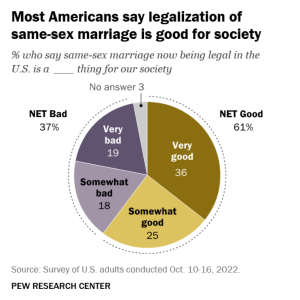 Most Americans also are on board, according to a Nov. 15 Pew Research Center survey reporting that 61% of Americans express positive views of legalized same-sex marriage. That included 36% who described legalizing same-sex unions as “very good for society.”
Most Americans also are on board, according to a Nov. 15 Pew Research Center survey reporting that 61% of Americans express positive views of legalized same-sex marriage. That included 36% who described legalizing same-sex unions as “very good for society.”
If the Respect for Marriage Act becomes law, it will repeal the Defense of Marriage Act, or DOMA, which was signed into law by President Bill Clinton in 1996 to shield states from being required to recognize same-sex marriages performed in other states. The new legislation also requires the federal government to recognize interracial and same-gender unions, thus protecting couples’ marriage rights in any state.
Support for the legislation picked up steam earlier this year when Supreme Court Justice Clarence Thomas wrote in his opinion overturning Roe v. Wade that the court should consider rescinding a 2015 ruling granting marriage equality.
While some faith groups, including the Southern Baptist Convention and Catholic Church, are opposed to the Respect for Marriage Act, numerous others, including the Church of Jesus Christ of Latter-day Saints, have thrown their weight behind it.

Paul Raushenbush
As a married gay man raising two children, Raushenbush said the support of religious leaders lines up with the values of LGBTQ couples and families.
“We got married in the church and when we had children, they were both baptized in our church. And this Christmas, I know that one of them is auditioning for the part of a shepherd and the other will probably be a farm animal in the manger,” he said.
Raushenbush said he also views the Respect for Marriage Act from the perspective of a minister who has performed uncounted marriages, including many for same-sex and interracial couples. “What they all had in common were two people in love pledging to be with one another for better or for worse, and I blessed them in the name of God and pronounced them married with all the responsibilities and privileges that come from the state and the laws of our land.”
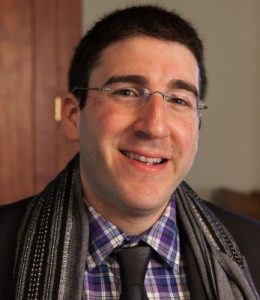
Jason Kaufman
Cantor Jason Kaufman of Beth El Hebrew Congregation in Alexandria, Va., emphasized the connection between the teachings of faith and LGBTQ marriage equity.
Kaufman also urged Congress to be swift in passing the legislation given the apparent eagerness of Thomas and his allies on the court to roll back marriage equity gains: “My husband and I are married but today my constitutional rights and the constitutional rights of millions of other Americans are jeopardized by a Supreme Court that has shown it is willing to roll back fundamental rights.”
Kaufman added that his faith compels him to advocate for equality for himself and others. “I am an ordained member of the Jewish community and a proud Reform Jew, I’m a teacher of Torah and I’m a gay man and there is no contradiction in this. I am part of a religious tradition that understands that all people are created in the image of God and should be treated as equals. My religion tells me that my family and millions of families like mine are deserving of equal justice under the law and that all marriages are worthy of dignity and respect.”
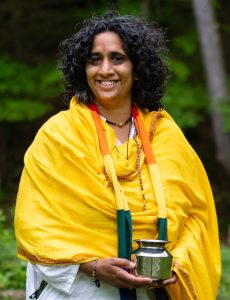
Sapna Pandya
Sapna Pandya, a queer Hindu priest, said the Respect for Marriage Act has the potential to bring healing to millions by legitimizing same-sex unions. She saw that happen in her own family when the Indian Supreme Court decriminalized homosexuality in 2018.
“We must not underestimate the extent to which legislation like this … has the potential to change hearts, minds and therefore lives,” she said. “When my family and community knew that mine and my wife’s marriage was sanctioned by law, that provided greater freedom and safety for them to express their (support). People of faith have the power and responsibility to join in solidarity with the LGBTQ community. In doing so, we can continue the sacred work of justice compassion and love.”
Related articles:
Bill to protect same-sex and interracial marriage now appears likely to become law
Weekly churchgoers are now the primary holdouts against same-sex marriage

